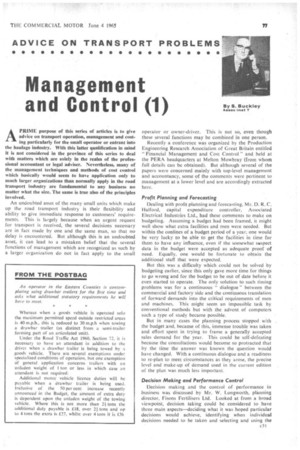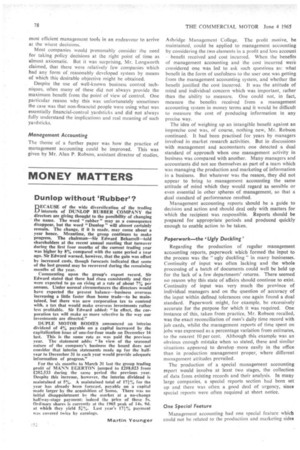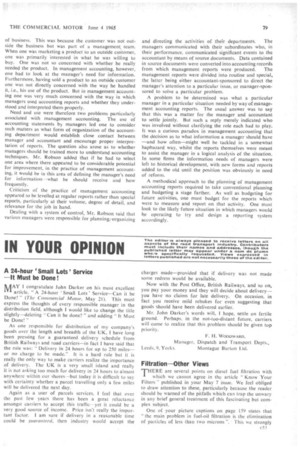Management and Control (1)
Page 79

Page 80

Page 81

If you've noticed an error in this article please click here to report it so we can fix it.
APRIME purpose of this series of articles is to give advice on transport operation, management and costing particularly' for the small operator or entrant into the haulage industry. With this latter qualification in mind it is not considered in the province of this series to deal with matters which are solely in the realm of the professional accountant or legal adviser. Nevertheless, many of the management techniques and methods of cost control which basically would seem to have application only to much larger organizations than normally apply in the road transport industry are fundamental to any business no matter what the size. The same is true also of the principles involved.
An undoubted asset of the many small units which make up the road transport industry is their flexibility and ability to give immediate response to customers' requirements. This is largely because when an urgent request for transport is received, the several decisions necessary are in fact made by one and the same man, so that no delay is encountered. But although this is an undoubted asset, it can lead to a mistaken belief that the several functions of management which are recognized as such by a larger organization do not in fact apply to the small
operator or owner-driver. This is not so, even though these several functions may be combined in one person.
Recently a conference was organized by the Production Engineering Research Association of Great Britain entitled " Financial Management and Cost Control" and held at the PERA headquarters at Melton Mowbray (from whom full details can be obtained). But although several of the papers were concerned mainly with top-level management and accountancy, some of the comments were pertinent to management at a lower level and are accordingly extracted here.
Profit Planning and Forecasting
Dealing with profit planning and forecasting, Mr. D. R. C. Halford, capital expenditure controller, Associated Electrical Industries Ltd., had these comments to make on budgeting. Assuming a budget had been framed, it might well show what extra facilities and men were needed. But within the confines of a budget period of a year one would be very lucky to be able to get the facilities in time for them to have any influence, even if the somewhat suspect data in the budget were accepted as adequate proof of need. Equally, one would be fortunate to obtain the additional staff that were expected.
But this was a difficulty which could not be solved by budgeting earlier, since this only gave more time for things to go wrong and for the budget to be out of date before it even started to operate. The only solution to such timing problems was for a continuous " dialogue" between the commercial and factory side and the continuous translation of forward demands into the critical requirements of men and machines. This might seem an impossible task by conventional methods but with the advent of computers such a type of study became possible.
But in many cases the planning process stopped with the budget and, because of this, immense trouble was taken and effort spent in trying to frame a generally accepted sales demand for the year. This could be self-defeating because the consultations would become so protracted that by the time the answer was known the question would have changed. With a continuous dialogue and a readiness to re-plan to meet circumstances as they arose, the precise level and make-up of demand used in the current edition of the plan was much less important.
Decision Making and Performance Control
Decision making and the control of performance in business was discussed by Mr. W. Longworth, planning director, Fisons Fertilisers Ltd. Looked at from a broad viewpoint, decision taking could be considered to have three main aspects—deciding what it was hoped particular decisions would achieve, identifying when individual decisions needed to be taken and selecting and using the
most efficient management tools in an endeavour to arrive at the wisest decisions.
Most companies would presumably consider the need for taking policy decisions at the right point of time as almost axiomatic. But it was surprising, Mr. Longworth claimed, that there were. relatively few companies which had any form of reasonably developed system by means of which this desirable objective might be obtained.
Despite the use of well-known business control techniques, often many of these did not always provide the maximum benefit from the point of view of control. One particular reason why this was unfortunately sometimes the case was that non-financial people were using what was essentially financial-control yardsticks and did not always fully understand the implications and real meaning of such yardsticks.
Management Accounting
The theme of a further paper was how the practice of management accounting could be improved. This was given by Mr. Alan P. Robson, assistant director of studies, Ashridge Management College. The profit motive, he maintained, could be applied to management accounting by considering the two elements in a profit and loss account benefit received and cost incurred. When the benefits of management accounting and the cost incurred were considered one was led to ask such questions as: what benefit in the form of usefulness to the user one was getting from the management accounting system, and whether the benefit justified the cost incurred. It was the attitude of mind and individual concern which was important, rather than the ability to measure. One could not, in fact, measure the benefits received from a management accounting system in money terms and it would be difficult to measure the cost of producing information in any precise way.
The idea of weighing up an intangible benefit against an imprecise cost was, of course, nothing new, Mr. Robson continued. It had been practised for years by managers involved in market research activities. But in discussions with management and accountants one detected a dual standard of approach when one management activity in business was compared with another. Many managers and accountants did not see themselves as part of a team which was managing the production and marketing of information in a business. But whatever was the reason, they did not appear to bring to management accounting the same attitude of mind which they would regard as sensible or even essential in other spheres of management, so that a dual standard of performance resulted.
Management accounting reports should be a guide to decision and action and should deal only with matters for which the recipient was responsible. Reports should be prepared for appropriate periods and produced quickly enough to enable action to be taken.
Paperwork—the 'Ugly Duckling'
Regarding the production of regular management accounting reports, paperwork which formed the input to the process was the " ugly duckling" in many businesses. Continuity of input was often lacking and the Whole processing of a batch of documents could well be held up for the lack of a few departments' returns. There seemed no reason why this state of affairs should continue to exist. Continuity of input was very much the province of individual managers and on the question of accuracy of the input within defined tolerances one again found a dual standard. Paperwork might, for example, be excessively accurate for the purpose for which it was required. One instance of this, taken from practice, Mr. Robson recalled, was the exact reconciliation of men's daily time record with job cards, whilst the management reports of time spent on jobs was expressed as a percentage variation from estimates, to the nearest 10 per cent. Although this example was an obvious enough mistake when so stated, these and similar situations appeared to develop more easily in the office than in production management proper; where different management attitudes prevailed.
The production of a special .management accounting report would involve at least two stages, the collection of data from existing records and their analysis. In many large companies, a special reports section had been set tip and there was often a good deal of urgency, since special reports were often required at short notice.
One Special Feature Management accounting had one special feature which could not he related to the production and marketing sides of business. This was because the customer was not outside the business but was part of a management team. When one was marketing a product to an outside customer, one was primarily interested in what he was willing to buy. One was not so concerned with whether he really needed the product. In management accounting, however, one had to look at the manager's need for information. Furthermore, having sold a product to an outside customer one was not directly concerned with the way he handled it, i.e., his use of the product. But in management accounting one was very much concerned with the way in which managers used accounting reports and whether they understood and interpreted them properly.
Need and use were therefore two problems particularly associated with management accounting. The use of accounting statements by managers led one to consider such matters as what form of organization of the accounting department would establish close contact between manager and accountant and encourage proper interpretation of reports. The question also arose as to whether managers should be trained more to understand accounting techniques. Mr. Robson added that if he had to select one area where there appeared to be considerable potential for improvement, in the practice of management accounting, it would be in this area of defining the manager's need for information—what he should receive and how frequently.
Criticism of the practice of management accounting appeared to be levelled at regular reports rather than special reports, particularly at their volume, degree of detail, and relevance for the job in hand.
Dealing with a system of control, Mr. Robson said that various managers were responsible for planning;organizing and directing the activities of their departments. The managers communicated with their subordinates who, in their performance, communicated significant events to the accountant by means of source documents. Data contained in source documents were converted into accounting records from which management reports were produced. The management reports were divided into routine and special, the latter being either accountant-sponsored to direct the manager's attention to a particular issue, or manager-sponsored to solve a particular problem.
A problem to be determined was what a particular manager in a particular situation needed by way of management accounting reports. The usual answer was to say that this was a matter for the manager and accountant to settle jointly. But such a reply merely indicated who was involved without clarifying the role each had to play. it was a curious paradox in management accounting that the decision as to what information a manager should have —and how often—might well be tackled in a somewhat haphazard way, whilst the reports themselves were meant to assist the manager in a logical analysis of the situation. In some firms the information needs of managers were left to historical development, with new forms and reports added to the old until the position was obviously in need of reform.
A methodical approach to the planning of management accounting reports required to take conventional planning and budgeting a stage farther. As well as budgeting for future activities, one must budget for the reports which were to measure and report on that activity. One must look to the likely future situation in which managers would be operating to try and design a reporting system accordingly.
























































































































